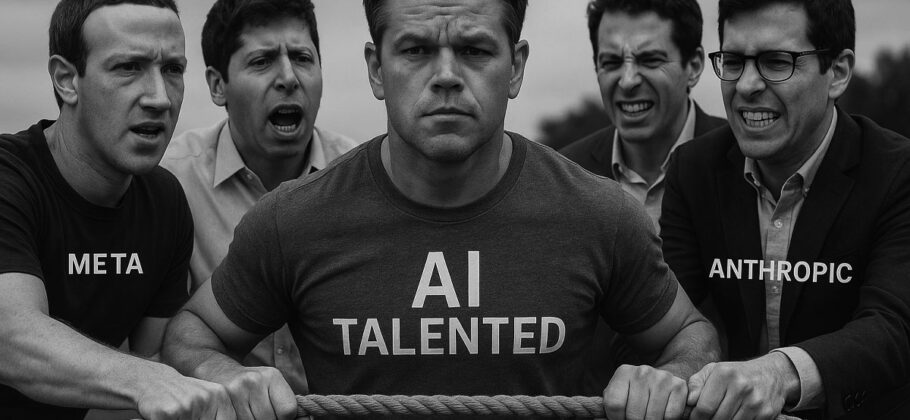The race to dominate artificial intelligence is no longer just about building powerful models or constructing massive data centers. It has become a war for people. The world’s largest technology companies are locked in a high-stakes struggle to recruit and retain the brightest minds in AI, offering jaw-dropping salaries and using aggressive hiring tactics that are beginning to alter the fabric of Silicon Valley itself.
Why AI Talent Matters So Much
The value of AI experts lies in their scarcity and their impact. There are only a limited number of researchers and engineers with the experience to design and train frontier-scale models, and their skills can determine whether a company surges ahead or falls behind. As one analysis put it, “Big Tech’s insatiable thirst for AI talent is threatening to kill its golden goose.” The belief inside these companies is clear: whoever secures the right people has the best shot at controlling the future of artificial intelligence.
Billion-Dollar Offers and Unorthodox Tactics
The offers on the table are staggering. Mark Zuckerberg’s Meta reportedly offered one researcher, Andrew Tulloch, a package worth as much as $1.5 billion spread over several years. According to reporting, Zuckerberg has also raided startups and rivals like Apple in his push to assemble a “superintelligence” team. As the Wall Street Journal described, these companies are “paying AI researchers billions of dollars and using unorthodox tactics to grab the brightest minds.”
One of the most striking strategies has been the “reverse acquihire.” Instead of buying a startup outright, Big Tech giants take what they want—the founders and top engineers—while leaving the rest of the company behind. Microsoft executed this move last year with Inflection AI, hiring its chief executive Mustafa Suleyman to run its Copilot business and paying a $650 million licensing fee. Meta followed suit with Scale AI, investing $14.8 billion in the company and, in exchange, bringing over CEO Alexandr Wang and a team of employees.
Google joined the fray in July, spending $2.4 billion to gut Windsurf, a startup that had also been in talks with OpenAI for a $3 billion acquisition. The fallout was painful for those left behind. Some of Windsurf’s remaining staff cried in the office after the deal, realizing their dreams of a big payday had vanished. As one account noted, “The remainder of the company was quickly snapped up by another AI startup, but those employees almost certainly didn’t get the kind of payday they were expecting.”
Multimillion-Dollar Pay Packages
The scale of compensation being offered to elite researchers is unlike anything seen in the history of the tech industry. Confidential Microsoft documents revealed that senior engineers could earn salaries over $400,000, plus stock awards exceeding $1 million. On-hire grants can add nearly $2 million more, and bonuses can reach 90 percent of base pay. Meta has reportedly been willing to spend up to $100 million on individual pay packages.
Even if the total value of billion-dollar offers depends heavily on stock performance, the symbolism is clear. As one observer explained, “Big Tech’s bottomless checkbook is open for a select few because AI’s leaders see themselves in a race to superintelligence. Whoever wins will dominate the world, they believe—so when it comes to hiring winning players, they just keep adding more zeros.”
The Cultural Toll on Startups
These hiring tactics may serve Big Tech’s short-term goals, but they are also destabilizing the culture that made Silicon Valley a hub of innovation. Traditionally, startups promised risk and reward. Most would fail, but those that succeeded could deliver life-changing wealth for employees who took equity instead of high salaries. The new trend threatens that balance.
Jon Sakoda, a venture capitalist and founding partner of Decibel, warned of the long-term damage: “There are a ton of employees who are bought into this system, and the history and the tradition is you come out here, you try to make something of value and if it works out, everybody wins. If you thought you had a share of a company and you actually didn’t have a share of a company, there’s a loss of trust.”
For rank-and-file startup workers, the result is grim. Instead of waiting years for equity payouts, top researchers are being plucked out and given guaranteed multimillion-dollar salaries. Those left behind in these hollowed-out startups are often left with nothing.
Startups Still Fighting Back
Despite the tidal wave of money from Big Tech, some startups are thriving by offering something money cannot buy: autonomy and a sense of mission. Anthropic, founded by former OpenAI executives, has attracted talent by emphasizing intellectual freedom and a culture that prioritizes high-impact research. The numbers tell the story. Employees are eight times more likely to leave OpenAI for Anthropic than the reverse, and eleven times more likely to move from DeepMind to Anthropic.
Investors are following this trend with enthusiasm. In the first quarter of 2025, venture capital investment in AI startups soared to $80.1 billion, a 28 percent increase from the previous quarter. Startups with experienced teams and strong technical pedigrees are commanding sky-high valuations. Dario Amodei’s Anthropic, for example, leapt from a $60 billion valuation to $170 billion in just six months.
Risks of Concentration and Inflation
Yet this gold rush is not without risks. The heavy concentration of talent in a few startups and Big Tech firms is creating bottlenecks and inflating valuations. Databricks raised $10 billion at a $62 billion valuation, a figure driven more by its leadership’s Big Tech credentials than by clear revenue models. Analysts warn that if these firms fail to deliver, the entire AI sector could face a painful correction.
Another concern is the lack of opportunities for younger engineers. With senior researchers filling roles that might once have gone to recent graduates, entry-level paths into the industry are shrinking. A report by SignalFire described this as the “experience paradox,” where the very success of these startups limits the training pipeline for the next generation.
Voices of Doubt
Not everyone is convinced that giant paychecks will produce the best results. OpenAI CEO Sam Altman has criticized Meta’s approach, writing in one memo that “missionaries will beat mercenaries.” He argued that while Meta has managed to hire a few great people, it “had to go quite far down their list” and that such lavish spending would create “very deep cultural problems.”
Ilya Sutskever, a cofounder of OpenAI who left to start Safe Superintelligence, has also turned down massive offers, promising that his new company would have “no distraction by management overhead or product cycles” and would be “insulated from short-term commercial pressures.” His decision reflects a broader truth: many top researchers are motivated not just by money but by the freedom to pursue their ideas without compromise.
The Future of the Talent War
The AI hiring spree shows no sign of slowing. LinkedIn reports that global hiring for AI-related roles has grown more than 300 percent over the last eight years. “Artificial Intelligence Engineer is one of the fastest-growing jobs in 15 countries and ranked number one in the Netherlands, Singapore, UK and US,” wrote Karin Kimbrough, LinkedIn’s chief economist.
Even as Big Tech lays off thousands in other areas, it spares no expense for AI. For these companies, the calculation is simple: spending a few more billion on human talent is worth it if it means not being left behind in the race toward artificial intelligence. Whether this strategy creates a new golden age of innovation or hollows out Silicon Valley’s ecosystem is a question that will shape the future of technology for decades to come.





